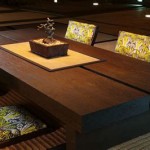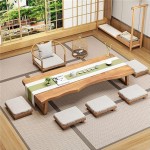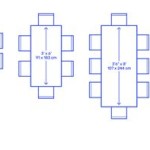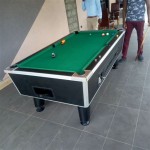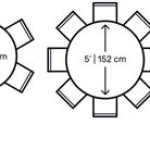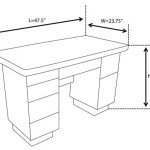Dining Table Against Wall Feng Shui: A Guide to Placement and Harmony
Feng shui, an ancient Chinese practice, focuses on harmonizing energy flows to promote well-being and prosperity. The placement of furniture within a space is a key aspect of feng shui, with specific principles applied to optimize energy flow. One common question that arises is whether a dining table should be placed against a wall according to feng shui principles.
While there are no strict rules dictating whether a dining table should be against a wall, certain considerations surrounding the placement of the dining table against a wall can have implications for the flow of energy according to feng shui. In this article, we explore the concept of dining table placement against a wall from a feng shui perspective, providing insights and practical guidance for creating a harmonious dining space.
The Significance of the Dining Table in Feng Shui
The dining table holds significant importance in feng shui. It represents the center of family gatherings, nourishment, and shared meals. Placing the dining table in a strategic location can influence the energy associated with these aspects. Ideally, the dining table should be positioned in a location that promotes connection, conversation, and a sense of shared experience.
Potential Challenges of Placing the Dining Table Against a Wall
According to feng shui principles, placing a dining table directly against a wall can pose certain challenges. The wall can restrict the free flow of chi (energy) and create a sense of confinement, potentially hindering open communication and a sense of ease during meals. It can also create a sense of imbalance, particularly if the table is positioned against a large or heavy wall.
However, it is important to remember that feng shui is a flexible practice, and the placement of a dining table should be considered in the context of the specific space and its unique characteristics. If you are placing a dining table against a wall, there are ways to mitigate potential issues.
Tips for Harmonizing a Dining Table Against a Wall
If your space necessitates placing a dining table against a wall, consider the following tips to enhance the flow of energy and create a harmonious dining experience:
1. Ensure Adequate Space and Flow
Even when placing a dining table against a wall, ensure that there is ample space around it, allowing for easy movement and a sense of openness. This can be achieved by ensuring a minimum of 3 feet of clear space around the table, particularly in front of it. Avoid placing large or heavy objects directly behind the table, such as a large bookcase or a densely populated wall. This will assist in preserving good energy flow to the table.
2. Utilize Mirrors to Enhance Space
Mirrors are a powerful tool in feng shui, and they are especially effective in creating the illusion of space and drawing in positive energy. A strategically placed mirror behind the dining table can create a sense of depth and prevent feelings of confinement. Ensure the mirror does not reflect the table itself, as this can create a negative energy loop.
3. Select a Round or Oval Table
While rectangular or square tables are commonly used, a round or oval dining table is considered more auspicious in feng shui. These shapes promote a pleasant flow of energy, encouraging a sense of unity and harmony among those sitting around the table. The round shape also symbolizes completeness and wholeness, creating a positive atmosphere for sharing meals and conversation.
4. Embrace Creative Placement
If the dining table needs to be placed against a wall, consider positioning it so it is slightly angled or offset from the wall, creating a focal point and a softer visual impact. This can provide a sense of separation and create a more inviting space for dining.
5. Choose Light and Airy Colors
Light and airy colors, such as white, cream, pastel tones, and light wood finishes, are generally favored in feng shui. Lighter colors and textures can make a small space feel more spacious and airy, while darker colors tend to absorb light and create a sense of heaviness. Incorporate these colors into the table's design or surrounding decor to complement the space.
6. Incorporate Plants and Flowers
The use of plants and flowers in feng shui can enhance the flow of energy and bring life to spaces. Place a few small plants or a vase of fresh flowers near the dining table to bring in fresh energy and create a more vibrant atmosphere. Choose plants with round or oval leaves, as these shapes are more harmonizing in feng shui.
7. Avoid Overcrowding
Keep the dining table area clutter-free. Excessive clutter can block energy flow and create feelings of stagnation. Ensure the space around the table is clear of unnecessary items and decorations.
Conclusion
Dining table placement is an important aspect of feng shui, and while placing a table against a wall may not always be ideal, it can be done in a way that minimizes potential negative energy flow. By following these principles and incorporating them into your dining space, you can enhance the flow of energy and create a harmonious and inviting atmosphere for sharing meals and creating positive memories.

Feng Shui Your Dining Room In 8 Steps Paul Darby

Feng Shui Your Dining Room In 8 Steps Paul Darby

Dining Table Against The Wall Best Solution To Maximize Your Sma Wehomz

A Perfect Treat How To Use Feng Shui For Better Dining Room Decoist

Feng Shui Your Dining Table

How To Feng Shui Your Dining Zone Houzz

A Perfect Treat How To Use Feng Shui For Better Dining Room Decoist

Table In A Corner Feng Shui Steps

A Perfect Treat How To Use Feng Shui For Better Dining Room Decoist

Feng Shui Dining Room Tips For More Connection Fulfillment


